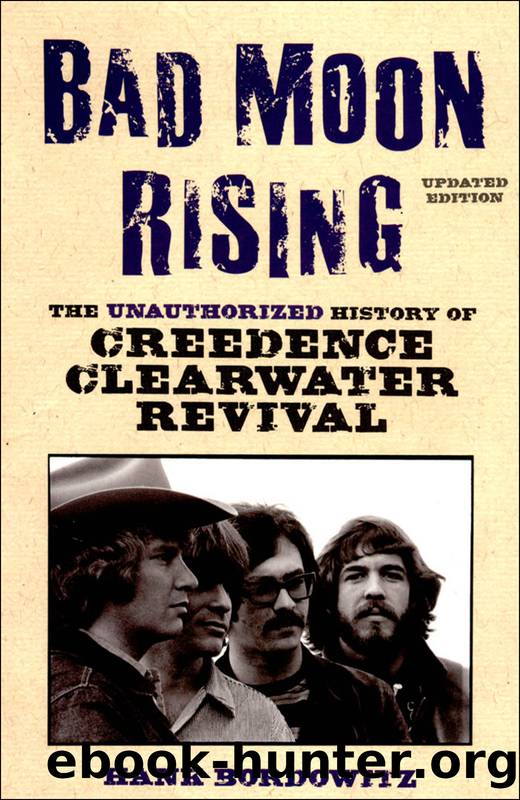Bad Moon Rising by Hank Bordowitz

Author:Hank Bordowitz
Language: eng
Format: epub
Publisher: Chicago Review Press
Published: 1998-08-14T16:00:00+00:00
25
“ALL I DID WAS WRITE A SONG
ABOUT A PIG”
John finished the album in another couple of weeks. The entire recording reportedly cost $35,000, in an era when bands like Fleetwood Mac and Foreigner were spending in excess of a million dollars and a year in the studio. In a final touch of irony, on the inner sleeve of the album, he paid homage to his old band: “This album is dedicated to Gossamer Wump and dreams that survive.”
Lenny Waronker and Mo Ostin were excited. John Fogerty breaks his silence after nearly ten years! They wanted to get the hype machine jump-started in a big way. “They had a large listening party,” John related. “They flew in … the entire field staff of Warner Bros. records to be at this listening.”
Suddenly, in the fall of 1984, the musical grapevine started buzzing with rumors of a new record by legendary rock recluse John Fogerty, the first music he’d made that anyone had heard in nearly a decade. When Centerfield came out in January 1985, it was like D. B. Cooper had emerged from the north woods with hundred dollar bills for everyone. It was a “cause to celebrate the return of one of rock’s favorite sons,” wrote David Hiltbrand in People.
“From the opening strains of ‘The Old Man Down the Road,’ it’s apparent that the one-time driving force of Creedence Clearwater Revival has lost nothing in his 10-year layoff,” wrote Bill Milkowski. “Apart from anything Bruce Springsteen or NRBQ has done recently, this album is the most honest, sincere, and American-sounding collection of rock & roll music to come along in some time. And it’s come along just in time.”
In John Swenson’s five star review in the Saturday Review, he asserted, “Fogerty has returned with a vengeance. He balances personal and moral concerns deftly in some of his strongest songwriting ever.”
“Hush children: we are in the presence of greatness,’ Allan Jones wrote in Melody Maker. “Since 1975’s John Fogerty, he has been silent, a brooding enigma. It was as if Fogerty, having reached definitive peaks with Creedence, simply couldn’t contemplate the potential embarrassment of releasing anything that failed to match his previous achievements. Listening to [Centerfield] is like finding new lips for a familiar passion.”
“While Fogerty hews close to the Creedence outline,” J. D. Considine wrote in Musician, “the texture of the music—clean, crisp, lean and uncluttered—is far more 80s than 70s…. But Fogerty’s greatest talent is an ability to construct songs that are such perfect metaphors he never has to state his case…. Here’s hoping it won’t be another ten years for our next chance to get this excited.”
In assessing his reason for including it in the Top 100 Albums of the 80s, Parke Putterbaugh said, “Look a little deeper and one finds an intensely autobiographical album: a survivor’s tale that celebrates the durability of rock & roll and the power inherent in remaining true to one’s own belief.”
“After a ten year absence,” Kurt Loder wrote in his four-star Rolling Stone
Download
This site does not store any files on its server. We only index and link to content provided by other sites. Please contact the content providers to delete copyright contents if any and email us, we'll remove relevant links or contents immediately.
| Classical | Country & Folk |
| Heavy Metal | Jazz |
| Pop | Punk |
| Rap & Hip-Hop | Rhythm & Blues |
| Rock |
Cecilia; Or, Memoirs of an Heiress — Volume 3 by Fanny Burney(30934)
Cecilia; Or, Memoirs of an Heiress — Volume 2 by Fanny Burney(30889)
Fanny Burney by Claire Harman(25784)
We're Going to Need More Wine by Gabrielle Union(18072)
Plagued by Fire by Paul Hendrickson(16636)
Cat's cradle by Kurt Vonnegut(13866)
Bombshells: Glamour Girls of a Lifetime by Sullivan Steve(13108)
All the Missing Girls by Megan Miranda(12747)
Leonardo da Vinci by Walter Isaacson(11901)
4 3 2 1: A Novel by Paul Auster(11047)
Adultolescence by Gabbie Hanna(8145)
The remains of the day by Kazuo Ishiguro(7551)
Note to Self by Connor Franta(7024)
Diary of a Player by Brad Paisley(6866)
Giovanni's Room by James Baldwin(5877)
What Does This Button Do? by Bruce Dickinson(5527)
Recovery by Russell Brand(4564)
Born a Crime by Trevor Noah(4510)
The Kite Runner by Khaled Hosseini(4431)
